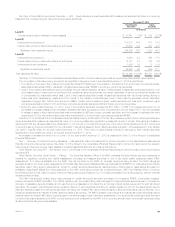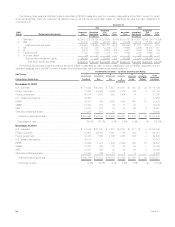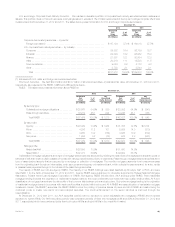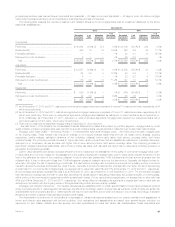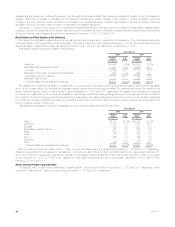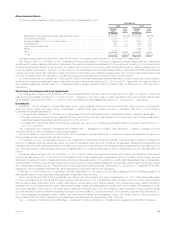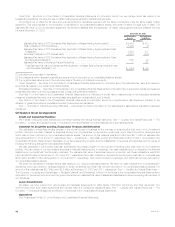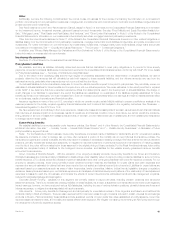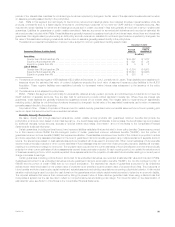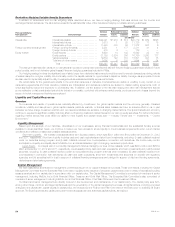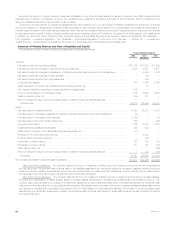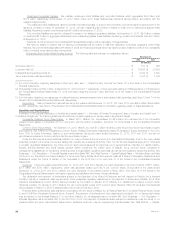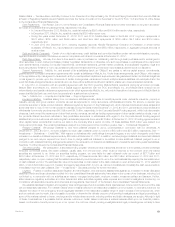MetLife 2012 Annual Report Download - page 55
Download and view the complete annual report
Please find page 55 of the 2012 MetLife annual report below. You can navigate through the pages in the report by either clicking on the pages listed below, or by using the keyword search tool below to find specific information within the annual report.Other
Additionally, we have the following commitments in the normal course of business for the purpose of enhancing the total return on our investment
portfolio: commitments to fund partnership investments; mortgage loan commitments; and commitments to fund bank credit facilities, bridge loans and
private corporate bond investments.
See “Net Investment Income” and “Net Investment Gains (Losses)” in Note 8 of the Notes to the Consolidated Financial Statements for information
on the investment income, investment expense, gains and losses from such investments. See also “Fixed Maturity and Equity Securities Available-for-
Sale,” “Mortgage Loans,” “Real Estate and Real Estate Joint Ventures,” and “Other Limited Partnerships” in Note 8 of the Notes to the Consolidated
Financial Statements for information on our investments in fixed maturity securities, mortgage loans and partnership investments.
Other than the commitments disclosed in Note 21 of the Notes to the Consolidated Financial Statements, there are no other material obligations or
liabilities arising from the commitments to fund partnership investments, mortgage loans, bank credit facilities, bridge loans, and private corporate bond
investments. For further information on commitments to fund partnership investments, mortgage loans, bank credit facilities, bridge loans and private
corporate bond investments. See “— Liquidity and Capital Resources — The Company — Contractual Obligations.”
In addition, see “Primary Risks Managed by Derivatives and Non-Derivatives” in Note 9 of the Notes to the Consolidated Financial Statements for
further information on interest rate lock commitments.
Insolvency Assessments
See Note 21 of the Notes to the Consolidated Financial Statements.
Policyholder Liabilities
We establish, and carry as liabilities, actuarially determined amounts that are calculated to meet policy obligations or to provide for future annuity
payments. Amounts for actuarial liabilities are computed and reported in the consolidated financial statements in conformity with GAAP. For more details
on Policyholder Liabilities, see “— Summary of Critical Accounting Estimates.”
Due to the nature of the underlying risks and the high degree of uncertainty associated with the determination of actuarial liabilities, we cannot
precisely determine the amounts that will ultimately be paid with respect to these actuarial liabilities, and the ultimate amounts may vary from the
estimated amounts, particularly when payments may not occur until well into the future.
Our actuarial liabilities for future benefits are adequate to cover the ultimate benefits required to be paid to policyholders. We periodically review our
estimates of actuarial liabilities for future benefits and compare them with our actual experience. We revise estimates, to the extent permitted or required
under GAAP, if we determine that future expected experience differs from assumptions used in the development of actuarial liabilities. We charge or
credit changes in our liabilities to expenses in the period the liabilities are established or re-estimated. If the liabilities originally established for future
benefit payments prove inadequate, we must increase them. Such an increase could adversely affect our earnings and have a material adverse effect
on our business, results of operations and financial condition.
Insurance regulators in many of the non-U.S. countries in which we operate require certain MetLife entities to prepare a sufficiency analysis of the
reserves presented in the locally required regulatory financial statements, and to submit that analysis to the regulatory authorities. See “Business —
International Regulation” in the 2012 Form 10-K.
We have experienced, and will likely in the future experience, catastrophe losses and possibly acts of terrorism, as well as turbulent financial markets
that may have an adverse impact on our business, results of operations, and financial condition. Due to their nature, we cannot predict the incidence,
timing, severity or amount of losses from catastrophes and acts of terrorism, but we make broad use of catastrophic and non-catastrophic reinsurance
to manage risk from these perils.
Future Policy Benefits
We establish liabilities for amounts payable under insurance policies. See Notes 1 and 4 of the Notes to the Consolidated Financial Statements for
additional information. See also “ — Industry Trends — Interest Rate Stress Scenario” and “— Variable Annuity Guarantees.” A discussion of future
policy benefits by segment follows.
Retail. For the Retail Life & Other business, future policy benefits are comprised mainly of liabilities for traditional life and for universal and variable
life insurance contracts. In order to manage risk, we have often reinsured a portion of the mortality risk on new individual life insurance policies. The
reinsurance programs are routinely evaluated and this may result in increases or decreases to existing coverage. We have entered into various derivative
positions, primarily interest rate swaps and swaptions, to mitigate the risk that investment of premiums received and reinvestment of maturing assets
over the life of the policy will be at rates below those assumed in the original pricing of these contracts. For the Retail Annuities business, future policy
benefits are comprised mainly of liabilities for life-contingent income annuities, and liabilities for the variable annuity guaranteed minimum benefits
accounted for as insurance.
Group, Voluntary & Worksite Benefits. With the exception of our property & casualty products, future policy benefits for our Group and Voluntary &
Worksite businesses are comprised mainly of liabilities for disabled lives under disability waiver of premium policy provisions, liabilities for survivor income
benefit insurance, LTC policies, active life policies and premium stabilization and other contingency liabilities held under life insurance contracts. For our
property & casualty products, future policy benefits include unearned premium reserves and liabilities for unpaid claims and claim expenses and
represent the amount estimated for claims that have been reported but not settled and claims incurred but not reported. Liabilities for unpaid claims are
estimated based upon assumptions such as rates of claim frequencies, levels of severities, inflation, judicial trends, legislative changes or regulatory
decisions. Assumptions are based upon our historical experience and analyses of historical development patterns of the relationship of loss adjustment
expenses to losses for each line of business, and consider the effects of current developments, anticipated trends and risk management programs,
reduced for anticipated salvage and subrogation.
Corporate Benefit Funding. Liabilities for this segment are primarily related to payout annuities, including pension closeouts and structured
settlement annuities. There is no interest rate crediting flexibility on these liabilities. As a result, a sustained low interest rate environment could negatively
impact earnings; however, we have employed various ALM strategies, including the use of various derivative positions, primarily interest rate floors and
interest rate swaps, to mitigate the risks associated with such a scenario.
Latin America. Future policy benefits for this segment are held primarily for immediate annuities in Chile, Argentina and Mexico and traditional life
contracts mainly in Brazil and Mexico. There are also reserves held for total return pass-through provisions included in certain universal life and savings
products in Mexico. Factors impacting these liabilities include sustained periods of lower yields than rates established at policy issuance, lower than
expected asset reinvestment rates, and mortality and lapses different than expected. We mitigate our risks by implementing an ALM policy and through
the development of periodic experience studies.
MetLife, Inc. 49


